学生讲义_英诗_2011
- 格式:doc
- 大小:96.00 KB
- 文档页数:29
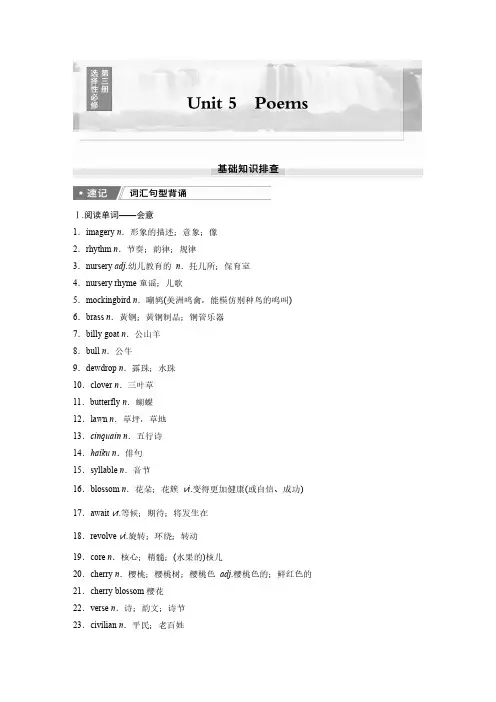
Ⅰ.阅读单词——会意1.imagery n.形象的描述;意象;像2.rhythm n.节奏;韵律;规律3.nursery adj.幼儿教育的n.托儿所;保育室4.nursery rhyme童谣;儿歌5.mockingbird n.嘲鸫(美洲鸣禽,能模仿别种鸟的鸣叫) 6.brass n.黄铜;黄铜制品;铜管乐器7.billy goat n.公山羊8.bull n.公牛9.dewdrop n.露珠;水珠10.clover n.三叶草11.butterfly n.蝴蝶12.lawn n.草坪,草地13.cinquain n.五行诗14.haiku n.俳句15.syllable n.音节16.blossom n.花朵;花簇v i.变得更加健康(或自信、成功) 17.await v t.等候;期待;将发生在18.revolve v i.旋转;环绕;转动19.core n.核心;精髓;(水果的)核儿20.cherry n.樱桃;樱桃树;樱桃色adj.樱桃色的;鲜红色的21.cherry blossom樱花22.verse n.诗;韵文;诗节23.civilian n.平民;老百姓24.prose n.散文25.dominant adj.首要的;占支配地位的;显著的26.sonnet n.十四行诗27.barren adj.贫瘠的;不结果实的Ⅱ.重点单词——记形1.rhyme n.押韵词;押韵的短诗v i.&v t.(使)押韵2.folk adj.民间的;民俗的;普通百姓的3.diamond n.钻石;金刚石;菱形4.bee n.蜜蜂5.dawn n.黎明;开端;萌芽6.amateur n.业余爱好者adj.业余的;业余爱好的7.mood n.情绪;心情;语气8.tease v i.&v t.取笑(某人);揶揄;逗弄9.format n.格式;总体安排;(出版物的)版式v t.格式化10.delicate adj.精美的;精致的;脆弱的11.utter v t.出声;说;讲adj.完全的;十足的;彻底的12.comprehension n.理解力;领悟力;理解练习13.shelf n.(pl.shelves)架子;搁板14.blank adj.空白的;无图画(或韵律、装饰)的;没表情的n.空白;空格15.version n.版本;(从不同角度的)说法16.era n.时代;年代;纪元17.sow v t.&v i.(sowed,sown/sowed)播种;种18.seed n.种子;起源;萌芽19.deadline n.最后期限;截止日期20.contest n.比赛;竞赛;竞争v t.争取赢得(比赛、选举等);争辩21.polish v t.修改;润色;抛光n.上光剂;抛光;擦亮22.string n.细绳;线;一串v t.(strung,strung)悬挂;系adj.弦乐器的;线织的23.wherever conj.在任何地方;在所有……的情况下ad v.(用于问句)究竟在(到)哪里24.grief n.悲伤;悲痛;伤心事25.complicated adj.复杂的;难懂的26.prejudice n.偏见;成见v t.使怀有(或形成)偏见Ⅲ.拓展单词——悉变1.drama n.戏;剧;戏剧艺术→dramatic adj.戏剧(性)的;突然的→dramatically ad v.突然地;戏剧性地;引人注目地2.sorrow n.悲伤;悲痛;伤心事v i.感到悲伤→sorrowful adj.悲伤的;悲哀的3.literary adj.文学的;爱好文学的;有文学作品特征的→literature n.文学4.recite v t.背诵;吟诵;列举→recitation n.朗诵;逐一叙述5.respectively ad v.分别;各自;依次为→respective adj.分别的;各自的6.sympathetic adj.同情的;有同情心的;赞同的→sympathy n.同情;赞同7.innocence n.天真;单纯;无罪→innocent adj.天真无邪的;无辜的;无恶意的8.correspondence n.来往信件;通信联系→correspond v i.相一致;符合;相当于;通信9.variation n.变化;变体;变奏曲→vary v i.变化;不同→various adj.不同的;各种各样的→variety n.多样性;变化10.racial adj.种族的;人种的→race n.竞争;种族v i.&v t.(与……)赛跑;(与……)竞争1.mighty/'ma I ti/adj.强大的;强有力的;非凡的2.obsess/əb'ses/v t.使痴迷;使迷恋be obsessed with痴迷于;沉迷于3.curse/kɜːs/v t.&v i.诅咒;咒骂4.embrace/I m'bre I s/v t.欣然接受;抱;拥抱5.migrant/'ma Iɡrənt/n.(为工作)移居者;移民;候鸟;迁徙动物→migrate/maI'greIt/v i.移居;迁移;迁徙6.indulge/I n'dʌldʒ/v t.&v i.沉迷(于);放纵indulge oneself放纵;享受indulge in沉迷;沉溺于7.inherit/I n'her I t/v t.&v i.经遗传获得;继承(遗产);继任8.deposit/d I'pɒz I t/n.存款;押金;订金v t.存入银行;付押金;付订金9.exceed/I k'siːd/v t.超过(数量);超越(法律、命令等)的限制10.cautious/'kɔːʃəs/adj.小心的;谨慎的→caution/'kɔːʃn/n.谨慎;小心Ⅳ.背核心短语1.be made up of由……组成(构成)2.to the point切题3.make sense有意义;讲得通4.consist of由……组成/构成5.be popular with受……的欢迎6.in particular尤其;特别7.of one’s own属于自己的8.pay attention to注意9.keep up with跟上,赶上10.be based on以……为基础Ⅴ.悟经典句式1.There are various reasons why people compose poetry.(why引导的定语从句)人们创作诗歌有各种各样的原因。
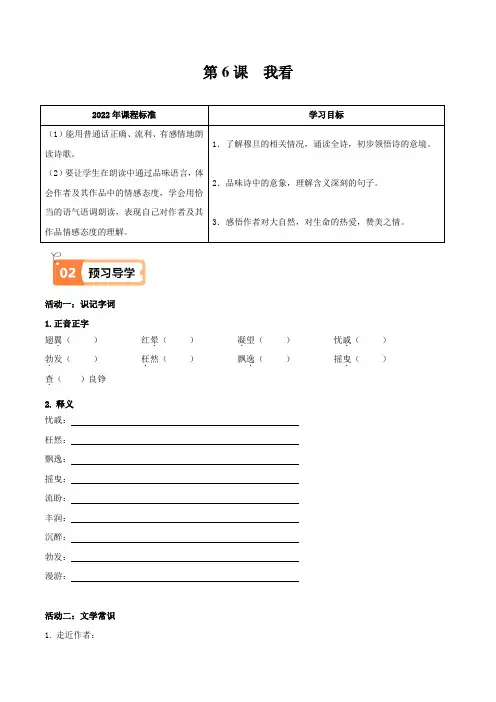
第6课我看2022年课程标准学习目标(1)能用普通话正确、流利、有感情地朗读诗歌。
(2)要让学生在朗读中通过品味语言,体会作者及其作品中的情感态度,学会用恰当的语气语调朗读,表现自己对作者及其作品情感态度的理解。
1.了解穆旦的相关情况,诵读全诗,初步领悟诗的意境。
2.品味诗中的意象,理解含义深刻的句子。
3.感悟作者对大自然,对生命的热爱,赞美之情。
活动一:识记字词1.正音正字翅翼.()红晕.()凝.望()忧戚.()勃.发()枉.然()飘逸.()摇曳.()查.()良铮2.释义忧戚:枉然:飘逸:摇曳:流盼:丰润:沉醉:勃发:漫游:活动二:文学常识1.走近作者:穆旦(1918—1977),,家。
原名,曾用笔名梁真,穆旦的诗风富于象征寓意和思辨色彩,他是“诗派”的代表诗人。
主要译作有俄国普希金的,英国雪莱的等。
2.了解背景。
本诗选自《穆旦诗文集》(人民文学出版社2014年第2版),这首诗作于1938 年,是穆旦在昆明西南联大的大学时代所写。
当时诗人20岁,是西南联大“南湖诗社”社员,正值人生的春天。
诗歌写的是蒙自的春天留给诗人的印象以及诗人从中获得的生命感悟。
活动三:诗歌朗读要求:读准字音、读出重音、停顿、速度、节奏、读出情感。
朗读指导:(1)读出对自然美景的喜爱与陶醉之情,读出诗人的激情与活力。
(2)注意重音、停顿、语速、节奏。
如:①我看/飞鸟/平展着翅翼静静吸入/深远的晴空里②多少年来/你丰润的生命永在/寂静的谐奏里/勃发③叫天风/挽你/坦荡地漫游,像/鸟的歌唱,云的流盼,树的摇曳④让/我的呼吸/与自然合流!让/欢笑和哀愁/洒向我心里,像季节/燃起花朵/又把它吹熄活动四:感知内容。
1.这首诗主要写了哪些意象?表达了作者怎样的思想感情?2.请把诗歌分成两个部分,并概括每部分的意思。
活动五:探究理解1.诗歌的前两节描绘了怎样的图画?2.诗歌后三节都是诗人所思,其内容有什么不同?3.诗歌第③④节中运用第二人称“你”有什么作用?4.总结主旨这首诗歌用优美的语言描绘了春天的美丽画卷,感悟生命的美好,引发了诗人对充满生机的生命的礼赞,表达了。
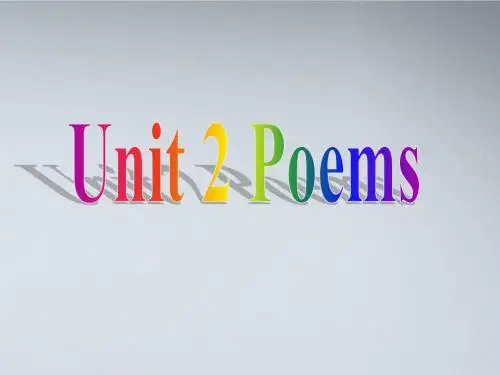
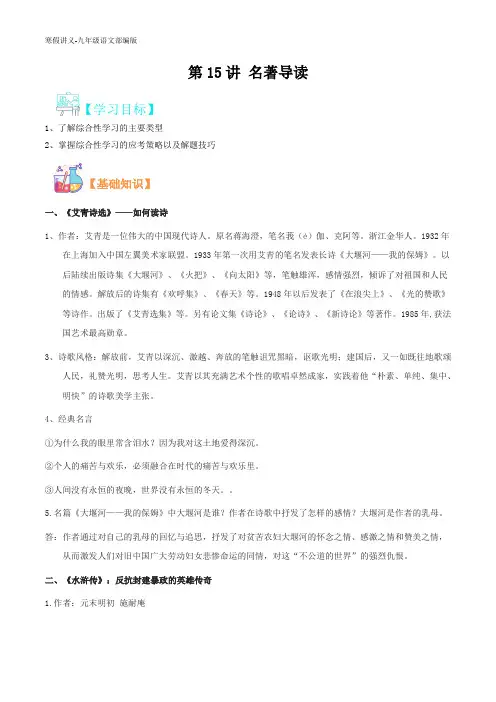
第15讲名著导读【学习目标】1、了解综合性学习的主要类型2、掌握综合性学习的应考策略以及解题技巧【基础知识】一、《艾青诗选》——如何读诗1、作者:艾青是一位伟大的中国现代诗人。
原名蒋海澄,笔名莪(é)伽、克阿等。
浙江金华人。
1932年在上海加入中国左翼美术家联盟。
1933年第一次用艾青的笔名发表长诗《大堰河——我的保姆》。
以后陆续出版诗集《大堰河》、《火把》、《向太阳》等,笔触雄浑,感情强烈,倾诉了对祖国和人民的情感。
解放后的诗集有《欢呼集》、《春天》等。
1948年以后发表了《在浪尖上》、《光的赞歌》等诗作。
出版了《艾青选集》等。
另有论文集《诗论》、《论诗》、《新诗论》等著作。
1985年,获法国艺术最高勋章。
3、诗歌风格:解放前,艾青以深沉、激越、奔放的笔触诅咒黑暗,讴歌光明;建国后,又一如既往地歌颂人民,礼赞光明,思考人生。
艾青以其充满艺术个性的歌唱卓然成家,实践着他“朴素、单纯、集中、明快”的诗歌美学主张。
4、经典名言①为什么我的眼里常含泪水?因为我对这土地爱得深沉。
②个人的痛苦与欢乐,必须融合在时代的痛苦与欢乐里。
③人间没有永恒的夜晚,世界没有永恒的冬天。
5.名篇《大堰河——我的保姆》中大堰河是谁?作者在诗歌中抒发了怎样的感情?大堰河是作者的乳母。
答:作者通过对自己的乳母的回忆与追思,抒发了对贫苦农妇大堰河的怀念之情、感激之情和赞美之情,从而激发人们对旧中国广大劳动妇女悲惨命运的同情,对这“不公道的世界”的强烈仇恨。
二、《水浒传》:反抗封建暴政的英雄传奇1.作者:元末明初施耐庵2.内容简介:《水浒传》是一部以北宋末年宋江起义为主要故事背景、类型上属于英雄传奇的章回体长篇小说。
它真实地描写了宋代农民起义发展和失败的全过程,说明造成农民起义的根本原因是"官逼民反"。
3.《水浒》人物性格特征:A、宋江:能团结兄弟,网罗人才;有军事、组织才能;性格既有反抗性,又有妥协性。
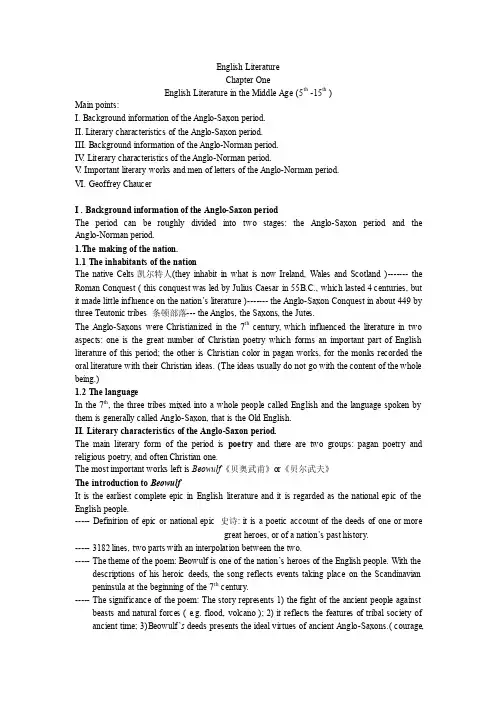
English LiteratureChapter OneEnglish Literature in the Middle Age (5th -15th )Main points:I. Background information of the Anglo-Saxon period.II. Literary characteristics of the Anglo-Saxon period.III. Background information of the Anglo-Norman period.IV. Literary characteristics of the Anglo-Norman period.V. Important literary works and men of letters of the Anglo-Norman period.VI. Geoffrey ChaucerI . Background information of the Anglo-Saxon periodThe period can be roughly divided into two stages: the Anglo-Saxon period and the Anglo-Norman period.1.The making of the nation.1.1 The inhabitants of the nationThe native Celts凯尔特人(they inhabit in what is now Ireland, Wales and Scotland )------- the Roman Conquest ( this conquest was led by Julius Caesar in 55B.C., which lasted 4 centuries, but it made little influence on the nation‘s literature )------- the Anglo-Saxon Conquest in about 449 by three Teutonic tribes 条顿部落--- the Anglos, the Saxons, the Jutes.The Anglo-Saxons were Christianized in the 7th century, which influenced the literature in two aspects: one is the great number of Christian poetry which forms an important part of English literature of this period; the other is Christian color in pagan works, for the monks recorded the oral literature with their Christian ideas. (The ideas usually do not go with the content of the whole being.)1.2 The languageIn the 7th, the three tribes mixed into a whole people called English and the language spoken by them is generally called Anglo-Saxon, that is the Old English.II. Literary characteristics of the Anglo-Saxon period.The main literary form of the period is poetry and there are two groups: pagan poetry and religious poetry, and often Christian one.The most important works left is Beowulf《贝奥武甫》or《贝尔武夫》The introduction to BeowulfIt is the earliest complete epic in English literature and it is regarded as the national epic of the English people.----- Definition of epic or national epic 史诗: it is a poetic account of the deeds of one or moregreat heroes, or of a nation‘s past history.----- 3182 lines, two parts with an interpolation between the two.----- The theme of the poem: Beowulf is one of the nation‘s heroes of the English people. With the descriptions of his heroic deeds, the song reflects events taking place on the Scandinavian peninsula at the beginning of the 7th century.----- The significance of the poem: The story represents 1) the fight of the ancient people against beasts and natural forces ( e.g. flood, volcano ); 2) it reflects the features of tribal society of ancient time; 3)Beowulf‘s deeds presents the ideal virtues of ancient Anglo-Saxons.( courage,prowess, devotion to his people )----- Characteristics of the poem: an alliterative verse头韵体诗歌; pagan in spirit and matter, yetwith visible Christian marks.III. Background information of the Anglo-Norman period.3.1 The Norman ConquestThe beginning of the Anglo-Norman period is marked by the Norman Conquest in 1066. The influences of the conquest on the English society are: 1) the nation turned from the tribal society to the feudal society; 2) the conquest brought for the nation French civilization and the French language.3.2 The languageAt first, French was the language of the upper class or the oppressor and Old English was the language of the oppressed. Then Old English was combined with French to form a new language ---- Middle EnglishIV. Literary characteristics of the Anglo-Norman periodThe main literary forms of the period are poetry and prose.( romance in the form of prose ) Literary characteristics------ 中古英诗呈现法国诗风与英格兰本土传统交融的情景。
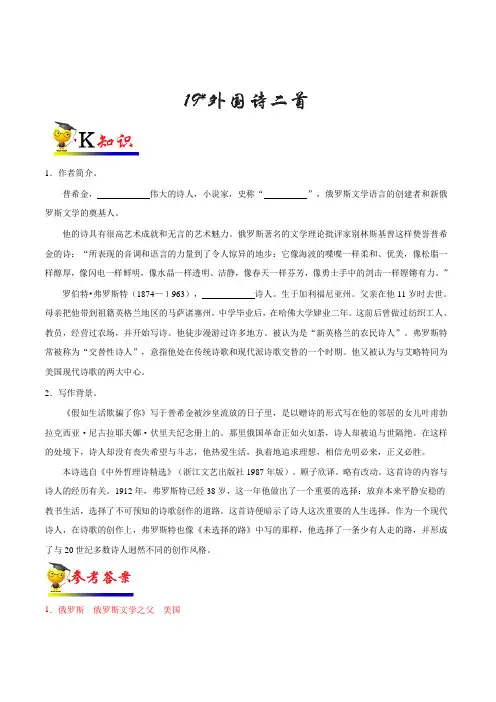
1.作者简介。
普希金,伟大的诗人,小说家,史称“”,俄罗斯文学语言的创建者和新俄罗斯文学的奠基人。
他的诗具有很高艺术成就和无言的艺术魅力。
俄罗斯著名的文学理论批评家别林斯基曾这样赞誉普希金的诗:“所表现的音调和语言的力量到了令人惊异的地步:它像海波的喋喋一样柔和、优美,像松脂一样醇厚,像闪电一样鲜明,像水晶一样透明、洁静,像春天一样芬芳,像勇士手中的剑击一样铿锵有力。
”罗伯特•弗罗斯特(1874—1963),诗人。
生于加利福尼亚州。
父亲在他11岁时去世。
母亲把他带到祖籍英格兰地区的马萨诸塞州。
中学毕业后,在哈佛大学肄业二年。
这前后曾做过纺织工人、教员,经营过农场,并开始写诗。
他徒步漫游过许多地方。
被认为是“新英格兰的农民诗人”。
弗罗斯特常被称为“交替性诗人”,意指他处在传统诗歌和现代派诗歌交替的一个时期。
他又被认为与艾略特同为美国现代诗歌的两大中心。
2.写作背景。
《假如生活欺骗了你》写于普希金被沙皇流放的日子里,是以赠诗的形式写在他的邻居的女儿叶甫勃拉克西亚·尼古拉耶夫娜·伏里夫纪念册上的。
那里俄国革命正如火如荼,诗人却被迫与世隔绝。
在这样的处境下,诗人却没有丧失希望与斗志,他热爱生活,执着地追求理想,相信光明必来,正义必胜。
本诗选自《中外哲理诗精选》(浙江文艺出版社1987年版)。
顾子欣译。
略有改动。
这首诗的内容与诗人的经历有关。
1912年,弗罗斯特已经38岁,这一年他做出了一个重要的选择:放弃本来平静安稳的教书生活,选择了不可预知的诗歌创作的道路。
这首诗便暗示了诗人这次重要的人生选择。
作为一个现代诗人,在诗歌的创作上,弗罗斯特也像《未选择的路》中写的那样,他选择了一条少有人走的路,并形成了与20世纪多数诗人迥然不同的创作风格。
1.俄罗斯俄罗斯文学之父美国1.我们应该用怎样的语气、语调朗读《假如生活欺骗了你》?本诗是作者用劝说的口吻、和缓的语气鼓励人们相信生活,相信未来。
所以应该用平等、娓娓而谈的语气,亲密和婉、热诚坦率的语调朗读。
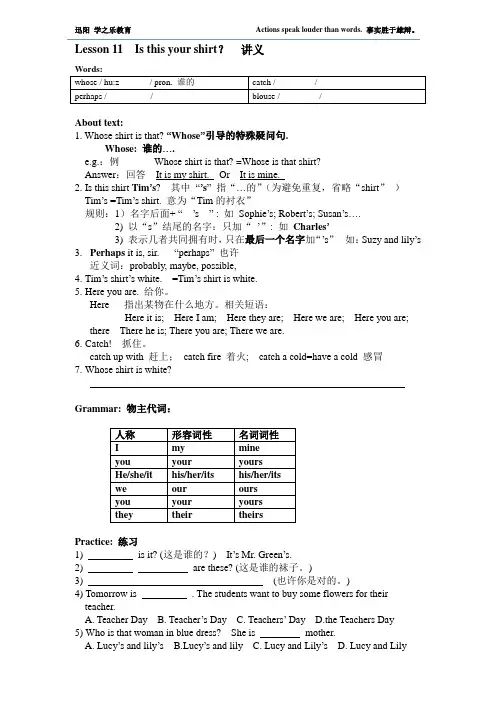
迅阳学之乐教育Actions speak louder than words. 事实胜于雄辩。
Lesson 11 Is this your shirt?讲义About text:1. Whose shirt is that?“Whose”引导的特殊疑问句.Whose: 谁的….e.g.:例Whose shirt is that? =Whose is that shirt?Answer:回答It is my shirt. Or It is mine.2. Is this shirt Tim’s? 其中“’s”指“…的”(为避免重复,省略“shirt”)Tim’s =Tim’s shirt. 意为“Tim的衬衣”规则:1)名字后面+ “’s ” : 如Sophie’s; Robert’s; Susan’s….2) 以“s”结尾的名字:只加“’”: 如Charles’3) 表示几者共同拥有时,只在最后一个名字加“’s”如:Suzy and lily’s 3.Perhaps it is, sir. “perhaps”也许近义词:probably, maybe, possible,4.Tim’s shirt’s white. =Tim’s shirt is white.5.Here you are. 给你。
Here 指出某物在什么地方。
相关短语:Here it is; Here I am; Here they are; Here we are; Here you are;there There he is; There you are; There we are.6.Catch! 抓住。
catch up with 赶上;catch fire 着火; catch a cold=have a cold 感冒7.Whose shirt is white?Grammar: 物主代词:Practice: 练习1) is it? (这是谁的?) It’s Mr. Green’s.2) are these? (这是谁的袜子。
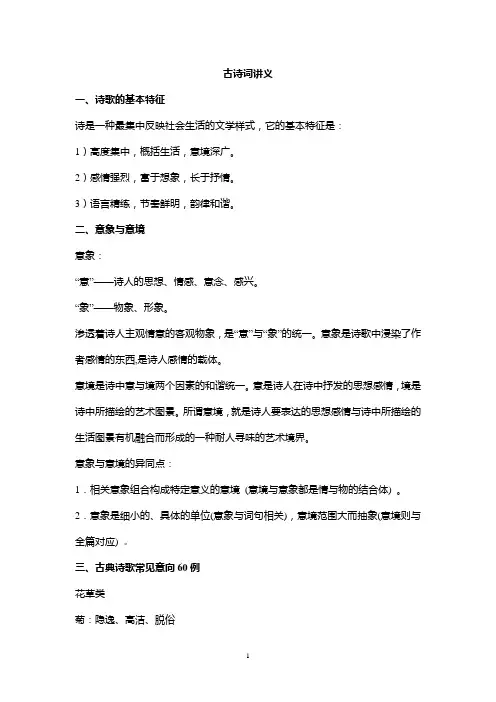
古诗词讲义一、诗歌的基本特征诗是一种最集中反映社会生活的文学样式,它的基本特征是:1)高度集中,概括生活,意境深广。
2)感情强烈,富于想象,长于抒情。
3)语言精练,节奏鲜明,韵律和谐。
二、意象与意境意象:“意”——诗人的思想、情感、意念、感兴。
“象”——物象、形象。
渗透着诗人主观情意的客观物象,是“意”与“象”的统一。
意象是诗歌中浸染了作者感情的东西,是诗人感情的载体。
意境是诗中意与境两个因素的和谐统一。
意是诗人在诗中抒发的思想感情,境是诗中所描绘的艺术图景。
所谓意境,就是诗人要表达的思想感情与诗中所描绘的生活图景有机融合而形成的一种耐人寻味的艺术境界。
意象与意境的异同点:1.相关意象组合构成特定意义的意境(意境与意象都是情与物的结合体) 。
2.意象是细小的、具体的单位(意象与词句相关),意境范围大而抽象(意境则与全篇对应) 。
三、古典诗歌常见意向60例花草类菊:隐逸、高洁、脱俗梅:傲雪、坚强、不屈不挠、逆境兰:高洁牡丹:富贵、美好禾黍:黍离之悲(国家的昔盛今衰)花开:希望、青春、人生的灿烂花落:凋零、失意,人生、事业的挫折,昔春,对美好事物的留恋、追怀草:生命力强、生生不息、希望、荒凉、偏僻、离恨、身份地位的卑微树木类树的曲直:事业、人生的坎坷、顺利黄叶:凋零、美人迟暮、新陈代谢绿叶:生命力、希望、活力松柏:坚挺、傲岸、坚强、生命力竹:气节、积极向上梧桐:凄苦柳:送别、留恋、伤感、春天的美好风霜雨雪云类海浪:人生的起伏东风:春天、美好春风:旷达、欢愉、希望露:人生的短促、生命的易逝天阴:压抑、愁苦、寂寞海浪的汹涌:人生凶险、江湖诡谲狂风:作乱、摧毁旧世界的力量西风:落寞惆怅、衰败、游子思归雪:纯洁、美好、环境的恶劣、恶势力的猖獗小雨:春景、希望、生机、活力、潜移默化式的教化烟雾:情感的朦胧、惨淡,前途的迷惘、渺茫,理想的落空、幻灭暴雨:残酷、热情、政治斗争、扫荡恶势力的力量、荡涤污秽的力量霜:人生易老,社会环境的恶劣,恶势力的猖狂,人生路途的坎坷、挫折江水:时光的流逝、岁月的短暂、绵长的愁苦、历史的发展趋势动物类子规:悲惨、凄惨鱼:自由、惬意鸿鹄:理想、追求猿猴:哀伤、凄厉乌鸦:荒凉、衰败、小人、俗客庸夫沙鸥:飘零、伤感狗、鸡:生活气息、田园生活(瘦)马:奔腾、追求、漂泊(孤)雁:孤独、思乡、思亲、音信、消息鹰:刚劲、自由、人生的搏击、事业的成功器物类玉:高洁、脱俗簪缨(冠):官位、名望颜色类白:纯洁、无暇、丧事红:热情奔放、青春、喜事绿:希望、活力、和平蓝:高雅、忧郁黄:温暖、和平紫:高贵、利国利民黑:黑暗、绝望、庄重、神秘、对死者的怀念、命途多舛其他类英雄:追慕、自愧自叹小人:鄙夷、明志、自省、鞭挞古迹:怀旧明志、昔盛今衰(国家)、衰败、萧条(古迹一般和古人密切相连)草原:辽阔、人生境界、人的胸怀仙境:飘逸、美妙洁净、忘尘厌俗天地:人类的渺小、人生的短暂、心胸的广阔、情感的孤独乡村:思归、厌俗、田园风光、生活气息、淳朴美好、安逸宁静城市(市井):繁荣热闹、富贵奢华破晓:初现希望朝阳:希望、朝气、活力夕阳:失落、消沉、珍惜美好而短暂的人生深夜:愁思、怀旧四、概括诗歌的意境,常用这样一些术语雄浑开阔、雄奇瑰丽、恢弘高远、浩瀚辽阔、博大新奇、深邃奇崛、朦胧渺远、空灵高远、空蒙迷茫、苍凉悲壮、优美迷人、清新明丽、清净幽远、宁静恬淡、清净悠闲、冷森幽僻、凄清冷落……五、古诗词表达技巧1.抒情方式:(①直接抒情②间接抒情:借景抒情、情景交融、托物言志、用典抒情、借古讽今、叙事抒情)2.描写手法(①渲染②动静③烘托④虚实⑤白描⑥欲扬先抑)3.修辞(①比喻②夸张③对偶④比拟⑤对比)六、常见的语言风格(1)平实质朴:其特点是选用确切的字眼直接陈述,或用白描,不加修饰,显得真切深刻,平易近人。
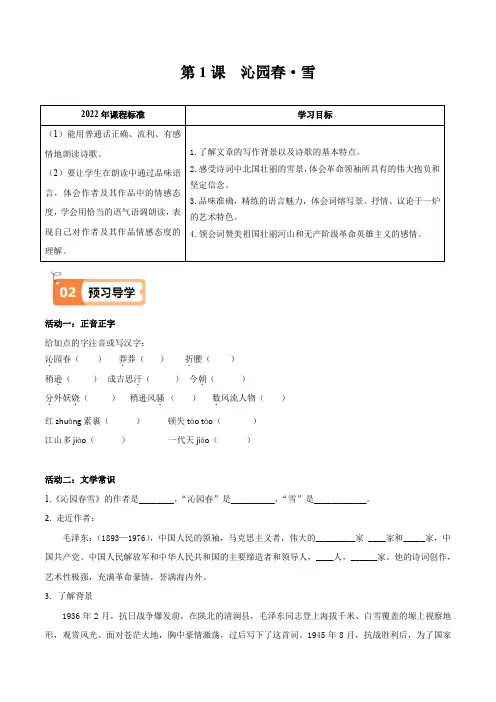
第1课沁园春·雪2022年课程标准学习目标(1)能用普通话正确、流利、有感情地朗读诗歌。
(2)要让学生在朗读中通过品味语言,体会作者及其作品中的情感态度,学会用恰当的语气语调朗读,表现自己对作者及其作品情感态度的理解。
1.了解文章的写作背景以及诗歌的基本特点。
2.感受诗词中北国壮丽的雪景,体会革命领袖所具有的伟大抱负和坚定信念。
3.品味准确,精练的语言魅力,体会词熔写景、抒情、议论于一炉的艺术特色。
4.领会词赞美祖国壮丽河山和无产阶级革命英雄主义的感情。
活动一:正音正字给加点的字注音或写汉字:沁.园春()莽.莽()折.腰()稍逊.()成吉思汗.()今朝.()分.外妖娆.()稍逊风骚.()数.风流人物()红zhuāng素裹()顿失tāo tāo()江山多jiāo()一代天jiāo()活动二:文学常识1.《沁园春雪》的作者是________,“沁园春”是__________,“雪”是____________。
2. 走近作者:毛泽东:(1893—1976),中国人民的领袖,马克思主义者,伟大的_________家 ____家和_____家,中国共产党、中国人民解放军和中华人民共和国的主要缔造者和领导人,____人,______家。
他的诗词创作,艺术性极强,充满革命豪情,誉满海内外。
3.了解背景1936年2月,抗日战争爆发前,在陕北的清涧县,毛泽东同志登上海拔千米、白雪覆盖的塬上视察地形,观赏风光。
面对苍茫大地,胸中豪情激荡,过后写下了这首词。
1945年8月,抗战胜利后,为了国家的前途的人民的利益,毛泽东同志亲赴重庆与国民党谈判。
其间,民主人士、诗人柳亚子先生请他写诗,毛泽东同志就把这首《沁园春.雪》抄给他,随后《新民晚报》公开发表,引起了极大的轰动。
活动三:诗歌朗读要求:读准字音、读出重音、停顿、速度、节奏、读出激越豪壮的情调。
朗读技巧[停顿与重音]北国/风光,千里/冰封,万里/雪飘。
望./长城内外,惟.余/莽莽;大河/上下,顿.失/滔滔。
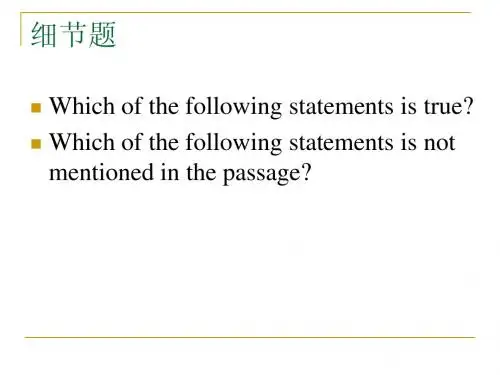
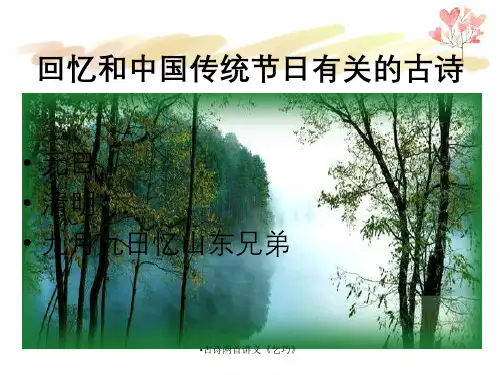
教案(展鑫磊) A Few Simple Forms of English Poems一、教学目标1. 让学生了解和掌握英语诗歌的基本形式,包括押韵诗、自由诗、十四行诗等。
2. 通过诗歌欣赏和创作,提高学生对英语语言的感知和运用能力。
3. 培养学生的审美情趣,激发他们对英语诗歌的热爱。
二、教学内容1. 押韵诗(Rhyming Poem):介绍押韵诗的基本结构,让学生欣赏和分析押韵诗的例子,自己创作一首押韵诗。
2. 自由诗(Free Verse):介绍自由诗的特点,让学生欣赏和分析自由诗的例子,自己创作一首自由诗。
3. 十四行诗(Sonnet):介绍十四行诗的结构和韵律,让学生欣赏和分析十四行诗的例子,自己创作一首十四行诗。
4. 俳句(Hku):介绍俳句的基本结构和主题,让学生欣赏和分析俳句的例子,自己创作一首俳句。
5. 民谣(Ballad):介绍民谣的基本特点,让学生欣赏和分析民谣的例子,自己创作一首民谣。
三、教学方法1. 讲授法:讲解诗歌的基本形式和特点,引导学生欣赏和分析诗歌。
2. 实践法:让学生通过创作诗歌,提高英语语言运用能力。
3. 互动法:组织学生进行诗歌朗诵、分享和讨论,培养他们的合作和交流能力。
四、教学步骤1. 引入:通过提问方式引导学生思考诗歌的形式和特点。
2. 讲解:讲解诗歌的基本形式,包括押韵诗、自由诗、十四行诗等。
3. 欣赏:让学生欣赏和分析不同形式的诗歌例子。
4. 创作:让学生自己创作一首诗歌,可以选取其中一种形式。
5. 分享:组织学生分享自己的创作,并进行互动交流。
五、教学评估1. 观察学生在课堂上的参与程度,了解他们对诗歌形式的掌握情况。
2. 评估学生的诗歌创作,关注他们的语言表达和创造力。
3. 收集学生的反馈意见,了解他们对诗歌教学的看法和建议。
六、教学资源1. 诗歌文本:收集不同形式的英语诗歌,用于教学欣赏和分析。
2. 诗歌创作指导:提供诗歌创作的模板和参考资料,帮助学生进行创作。
Course Syllabus5 lecturesUnit 1 What is Poetry?1. HopeHope is the thing with feathersThat perches in the soul,And sings the tune--without the words,And never stops at all,And sweetest in the gale is heard;And sore must be the stormThat could abash the little birdThat kept so many warm.I've heard it in the chillest land,And on the strangest sea;Yet, never, in extremity,It asked a crumb of me.2.Dreams—Langston HughesHold fast to dreamsFor if dreams dieLife is a broken winged birdThat cannot flyHold fast to dreamsFor when dreams goLife is a barren fieldFrozen with snow.3.From “Song of Myself”—written by Walt WhitmanI am the poet of the Body and I am the poet of the soul,The pleasure of heaven are with me and the pains of hell are with me,The first I graft and increase upon myself, the latter I translate into a new tongue.I am the poet of the woman the same as the man,And I say it is as great to be a woman as to be a man,And I say there is nothing greater than the mother of men.4.Ars Poetica—Archibald Macleish(1892-1982)A POEM should be palpable and muteAs a globed fruitDumbAs old medallions to the thumbSilent as the sleeve-worn stoneOf casement ledges where the moss has grown—A poem should be wordlessAs the flight of birdsA poem should be motionless in timeAs the moon climbsLeaving, as the moon releasesTwig by twig the night-entangled trees,Leaving, as the moon behind the winter leaves,Memory by memory the mind—A poem should be motionless in timeAs the moon climbsA poem should be equal to:Not trueFor all the history of griefAn empty doorway and a maple leafFor loveThe leaning grasses and two lights above the sea—A poem should not meanBut be.Unit 2 Rhythm of Poems1.A Grain of Sand--William Blake To see a world in a grain of sandAnd a heaven in a wild flowerHold infinity in the palm of your handAnd eternity in an hour2.The Tiger—William Blake Tiger! Tiger! Burning brightIn the forests of the night,What immortal hand or eyeCould frame thy fearful symmetry?In what distant deeps or skiesBurnt the fire of thine eyes?On what wings dare he aspire?What the hand dare seize the fire?And what shoulder, and what art,Could twist the sinews of thy heart?And when thy heart began to beat,What dread hand? and what dread feet?What the hammer? what the chain?In what furnace was thy brain?What the anvil? what dread graspDare its deadly terrors clasp?When the stars threw down their spears,And watered heaven with their tears,Did he smile his work to see?Did he who made the Lamb make thee?Tiger! Tiger! burning brightIn the forests of the night,What immortal hand or eyeDare frame thy fearful symmetry?3.THE LAMB--William Blake Little lamb, who made thee?Does thou know who made thee,Gave thee life, and bid thee feedBy the stream and o'er the mead;Gave thee clothing of delight,Softest clothing, woolly, bright;Gave thee such a tender voice,Making all the vales rejoice?Little lamb, who made thee?Does thou know who made thee?Little lamb, I'll tell thee;Little lamb, I'll tell thee:He is called by thy name,For He calls Himself a Lamb.He is meek, and He is mild,He became a little child.I a child, and thou a lamb,We are called by His name.Little lamb, God bless thee!Little lamb, God bless thee!4.A Red, Red Rose--Robert Burns(1759-1796) O my Luve's like a red, red rose,That's newly sprung in June:O my Luve's like the melodie,That's sweetly play'd in tune.As fair art thou, my bonie lass,So deep in luve am I;And I will luve thee still, my dear,Till a' the seas gang dry.Till a' the seas gang dry, my dear,And the rocks melt wi' the sun;And I will luve thee still, my dear,While the sands o' life shall run.And fare-thee-weel, my only Luve!And fare-thee-weel, a while!And I will come again, my Luve,Tho' it were ten thousand mile!5.Old Lang Syne--Robert Burns Should old acquaintance be forgot,And never brought to mind?Should auld acquaintance be forgot,And old lang syne?For old lang syne, my dear,For old lang syne,We'll tak a cup o' kindness yet,For old lang syne.And surely ye'll be your pint-stowp,And surely I'll be mine!And we'll tak a cup o' kindness yet,For old lang syne.For auld lang syne, my dear,For old lang syne,We'll tak a cup o' kindness yet,For old lang syne.We twa hae run about the braes,And pu'd the gowans fine;But we've wandered mony a weary fitSin' old lang syne.For old lang syne, my dear,For old lang syne,We'll tak a cup o' kindness yet,For old lang syne.We twa hae paidled i' the burn,Frae morning sun till dine;But seas between us braid hae roaredSin' old lang syne.For old lang syne, my dear,For old lang syne,We'll tak a cup o' kindness yet,For old lang syne.And there's a hand, my trusty fiere,And gie's a hand o' thine!And we'll tak a right guid-willie waughtFor old lang syne.For old lang syne, my dear,For old lang syne,We'll tak a cup o' kindness yet,For old lang syneUnit 3 Rhyme of Poems 1.When I Saw You Last, Rose-- Austin Dobson(1840-1921) When I saw you last, Rose,You were only so high;--How fast the time goes!Like a bud ere it blows,You just peeped at the sky,When I saw you last, Rose!Now your petals unclose,Now your May-time is nigh;--How fast the time goes!And a life,--how it grows!You were scarcely so shy,When I saw you last, Rose.In your bosom it showsThere's a guest on the sly;How fast the time goes!Is it Cupid? Who knows!Yet you used not to sigh,When I saw you last, Rose;How fast the time goes!2.As the raven flies, so speed me to my destiny.As the eagle sees, so show me where to go.As the wolf howls, so let me hear life's music.As the deer runs, so keep me safe from harm.As the stars shine, so light for me my path.As the hound tracks, so let me follow.Give me courage that I may face destiny without fear;But with guidance, music in my heart, and a sure path to follow.3.Shall I compare thee to a summer's day?Thou art more lovely and more temperate.Rough winds do shake the darling buds of MayAnd summer's lease hath all too short a date.4.I bring fresh showers for the thirsting flowers,From the seas and the streams;I bear light shade for the leaves when laidIn their noon-day dreams.From my wings are shaken the dews that wakenThe sweet buds every one,When rocked to rest on their mother's breast,As she dances about the Sun.I wield the flail of the lashing hail,And whiten the green plains under,And then again I dissolve it in rain,And laugh as I pass in thunder.5.ANNABEL LEEby Edgar Allan PoeIt was many and many a year ago,In a kingdom by the sea,That a maiden there lived whom you may knowBy the name of ANNABEL LEE;--And this maiden she lived with no other thoughtThan to love and be loved by me.She was a child and I was a child,In this kingdom by the sea,But we loved with a love that was more than love--I and my Annabel Lee--With a love that the winged seraphs of heaven Coveted her and me.And this was the reason that, long ago,In this kingdom by the sea,A wind blew out of a cloud by nightChilling my Annabel Lee;So that her high-born kinsman cameAnd bore her away from me,To shut her up in a sepulcherIn this kingdom by the sea.The angels, not half so happy in Heaven,Went envying her and me:--Yes! that was the reason (as all men know,In this kingdom by the sea)That the wind came out of a cloud, chillingAnd killing my Annabel Lee.But our love it was stronger by far than the loveOf those who were older than we--Of many far wiser than we-And neither the angels in Heaven above,Nor the demons down under the sea,Can ever dissever my soul from the soulOf the beautiful Annabel Lee:--For the moon never beams without bringing me dreams Of the beautiful Annabel Lee;And the stars never rise but I see the bright eyesOf the beautiful Annabel Lee;And so, all the night-tide, I lie down by the sideOf my darling, my darling, my life and my bride,In her sepulcher there by the sea--In her tomb by the side of the sea.Unit 4 Images of Poems1.I am silver and exact.I have no preconceptions.Whatever I see I swallow immediatelyJust as it is, unmisted by love or dislike.I am not cruel, only truthful—2.Spring, the sweet Spring, is the year’s pleasant king;Then blooms each thing, then maids dance in a ring, Cold doth not sting, the pretty birds do sing,Cuckoo, Jug-jug, pu-we, to-witta-woo!3.To Autumn--John Keats Season of mists and mellow fruitfulness,Close bosom-friend of the maturing sun;Conspiring with him how to load and blessWith fruit the vines that round the thatch-eves run;To bend with apples the moss'd cottage trees,And fill all fruit with ripeness to the core;To swell the gourd, and plump the hazel shellsWith a sweet kernel; to set budding more,And still more, later flowers for the bees,Until they think warm days will never cease,For Summer has o'er-brimm'd their clammy cells.Who hath not seen thee oft amid thy store? Sometimes whoever seeks abroad may findThee sitting careless on a granary floor,Thy hair soft-lifted by the winnowing wind;Or on a half-reap'd furrow sound asleep,Drows'd with the fume of poppies, while thy hook Spares the next swath and all its twined flowers;And sometimes like a gleaner thou dost keepSteady thy laden head across a brook;Or, by a cyder-press, with patient look,Thou watchest the last oozings hours by hours.Where are the songs of Spring? Ay, where are they? Think not of them, thou hast thy music too,-While barred clouds bloom the soft-dying day,And touch the stubble-plains with rosy hue;Then in a wailful choir the small gnats mournAmong the river sallows, borne aloftOr sinking as the light wind lives or dies;And full-grown lambs loud bleat from hilly bourn;Hedge-crickets sing; and now with treble softThe red-breast whistles from a garden-croft;And gathering swallows twitter in the skies.4.The Sick RoseWilliam Blake (1757—1827)O rose, thou are sick!The invisible wormThat flies in the night,In the howling storm,Has found out thy bedOf crimson joy,And his dark secret loveDoes thy life destroy.5.The Rose FamilyRobert Frost (1874-1963)The rose is a rose,And was always a rose.But the theory now goesThat the apple’s a rose,And the pear is, and so’sThe plum, I supposeThe dear only knowsWhat will next prove a rose.You, of course, are a rose—But were always a rose.6.TO THE VIRGINS—To Make Much of TimeBy Robert Herrick (1561-1674) Gather ye rose-buds while ye may,Old time is still a-flying:And this same flower that smiles to-day,To-morrow will be dying.The glorious Lamp of Heaven, the Sun,The higher he's a gettingThe sooner will his race be run,And nearer he's to setting.That age is best which is the first,When youth and blood are warmer;But being spent, the worse, and worstTimes, still succeed the former.Then be not coy, but use your time;And while ye may, go marry:For having lost but once your prime,You may for ever tarry.7.TO HIS COY MISTRESSAndrew Marvell (1621-1678) Had we but world enough, and time,This coyness, lady, were no crime.We would sit down, and think which wayTo walk, and pass our long love's day.Thou by the Indian Ganges' sideShould'st rubies find: I by the tideOf Humber would complain, I wouldLove you ten years before the flood,And you should, if you please, refuseTill the conversion of the Jews.My vegetable love should growVaster than empires, and more slow;An hundred years should go to praiseThine eyes, and on thy forehead gaze ;Two hundred to adore each breast,But thirty thousand to the rest ;An age at least to every part,And the last age should show your heart ;For, lady, you deserve this state,Nor would I love at lower rate.But at my back I always hearTime's winged chariot hurrying near ;And yonder all before us lieDeserts of vast eternity.Thy beauty shall no more be found,Nor, in thy marble vault, shall soundMy echoing song: then worms shall tryThat long-preserved virginity,And you quaint honor turn to dust,And into ashes all my lust :The grave's a fine and private place,But none, I think, do there embrace.Now, therefore, while the youthful hueSits on thy skin like morning dew,And while thy willing soul transpiresAt every pore with instant fires,Now let us sport us while we may,And now, like amorous birds of prey,Rather at once our time devour,Than languish in his slow-chapt power.Let us roll all our strength and allOur sweetness up into one ball,And tear our pleasures with rough strifeThrough the iron gates of life :Thus, though we cannot make our sunStand still, yet we will make him run.8.THE FLEAJohn Donne MARK but this flea, and mark in this,How little that which thou deniest me is;It suck'd me first, and now sucks thee,And in this flea our two bloods mingled be.Thou know'st that this cannot be saidA sin, nor shame, nor loss of maidenhead;Yet this enjoys before it woo,And pamper'd swells with one blood made of two;And this, alas! is more than we would do.O stay, three lives in one flea spare,Where we almost, yea, more than married are.This flea is you and I, and thisOur marriage bed, and marriage temple is.Though parents grudge, and you, we're met,And cloister'd in these living walls of jet.Though use make you apt to kill me,Let not to that self-murder added be,And sacrilege, three sins in killing three.Cruel and sudden, hast thou sincePurpled thy nail in blood of innocence?Wherein could this flea guilty be,Except in that drop which it suck'd from thee?Yet thou triumph'st, and say'st that thouFind'st not thyself nor me the weaker now.'Tis true; then learn how false fears be;Just so much honour, when thou yield'st to me, Will waste, as this flea's death took life from thee.Unit 5 Sonnet1. Sonnets written by William Shakespeare:a.Sonnet XVIII. Shall I compare thee to a summer's day?Thou art more lovely and more temperate: Rough winds do shake the darling buds of May, And summer's lease hath all too short a date: Sometime too hot the eye of heaven shines,And often is his gold complexion dimm'd;And every fair from fair sometime declines,By chance or nature's changing course untrimm'd; But thy eternal summer shall not fadeNor lose possession of that fair thou owest;Nor shall Death brag thou wander'st in his shade, When in eternal lines to time thou growest:So long as men can breathe or eyes can see,So long lives this and this gives life to thee.b.Sonnet 60 Like as the waves make towards the pebbled shore, So do our minutes hasten to their end;Each changing place with that which goes before, In sequent toil all forwards do contend. Nativity, once in the main of light,Crawls to maturity, wherewith being crown'd, Crooked elipses 'gainst his glory fight,And Time that gave doth now his gift confound. Time doth transfix the flourish set on youthAnd delves the parallels in beauty's brow,Feeds on the rarities of nature's truth,And nothing stands but for his scythe to mow:And yet to times in hope my verse shall stand,Praising thy worth, despite his cruel hand.c.Sonnet CXXXVIII(Sonnet 138)When my love swears that she is made of truthI do believe her, though I know she lies,That she might think me some untutor'd youth,Unlearned in the world's false subtleties.Thus vainly thinking that she thinks me young,Although she knows my days are past the best,Simply I credit her false speaking tongue:On both sides thus is simple truth suppress'd;But wherefore(why) says she not she is unjust?And wherefore say not I that I am old?O, love's best habit is in seeming trust,And age in love loves not to have years told:Therefore I lie with her and she with me,And in our faults by lies we flatter'd be.2. Sonnets written by other poets:a.SONNETS: Farewell Love and all thy laws for everThomas Wyatt (1503-1542)Farewell Love and all thy laws for ever,Thy baited hooks shall tangle me no more;Senec and Plato call me from thy loreTo perfect wealth my wit for to endeavour.In blind error when I did persever(persevere),Thy sharp repulse, that pricketh aye so sore,Hath taught me to set in trifles no storeAnd escape forth, since liberty is lever.Therefore farewell; go trouble younger heartsAnd in me claim no more authority;With idle youth go use thy propertyAnd thereon spend thy many brittle darts.For hitherto though I have lost all my time,Me lusteth no longer rotten boughs to climb.b.Sonnet 75Edmund Spenser (1552-1599)One day I wrote her name upon the strand,But came the waves and washed it away:Again I wrote it with a second hand,But came the tide and made my pains his prey."Vain man," said she, "that dost in vain essayA mortal thing so to immortalize;For I myself shall like to this decay,And eek my name be wiped out likewise.""Not so," quoth I; "let baser things deviseTo lie in dust, but you shall live by fame;My verse your virtues rare shall eternalize,And in the heavens write you glorious name:Where, whenas Death shall all the world subdue,Our love shall live, and later life renew."c.Sonnets from the Portuguese 43: How Do I Love TheeElizabeth Barrett Browning(1806-1861) How do I love thee? Let me count the waysI love thee to the depth and breadth and heightMy soul can reach, when feeling out of sight.For the ends of Being and ideal GraceI love thee to the level of everyday'sMost quiet need, by sun and candlelight.I love thee freely, as men strive for rightI love thee purely, as they turn from praiseI love thee with the passion put to useIn my old griefs, and with my childhood's faith.I love thee with a love I seemed to loseWith my lost saints, --I love thee with the breath,Smiles, tears, of all my life! -- and, if God choose,I shall but love thee better after death.Unit 6 Classical Poetry1.Ben Jonson(1572-1637)Song to CeliaDrink to me, only with thine eyes,And I will pledge with mine ;Or leave a kiss but in the cup,And I'll not look for wine.The thirst, that from the soul doth rise,Doth ask a drink divine :But might I of Jove's nectar sup,I would not change for thine.I sent thee late a rosy wreath,Not so much honoring thee,As giving it a hope, that thereIt could not wither'd be.But thou thereon didst only breathe,And sent'st it back to me:Since when it grows, and smells, I swear,Not of itself, but theeThat Women Are But Men's Shadows Follow a shadow, it still flies you;Seem to fly it, it will pursue:So court a mistress, she denies you;Let her alone, she will court you.Say, are not women truly thenStyled but the shadows of us men?At morn and even shades are longest,At noon they are or short or none;So men at weakest, they are strongest,But grant us perfect, they're not known.Say, are not women truly thenStyled but the shadows of us men?2. Alexander Pope (1688-1744)An Essay on Criticism (Excerpt: lines 215-232) A little learning is a dangerous thing;Drink deep, or taste not the Pierian spring:There shallow draughts intoxicate the brain,And drinking largely sobers us again.Fired at first sight with what the Muse imparts,In fearless youth we tempt the heights of arts,While from the bounded level of our mindShort views we take, nor see the lengths behind;But more advanced, behold with strange surpriseNew distant scenes of endless science rise!So pleased at first the towering Alps we try,Mount o’er the vales, and seem to tread the sky,The eternal snows appear already past,And the first clouds and mountains seem the last;But, those attained, we tremble to surveyThe growing labors of the lengthened way;The increasing prospect tires our wandering eyes,Hills o’er hills, and Alps on Alps arise!Unit 7 Romantic Poetry 1. Robert BurnsMy Heart's In The Highlands My heart's in the Highlands, my heart is not here,My heart's in the Highlands a-chasing the deer -A-chasing the wild deer, and following the roe;My heart's in the Highlands, wherever I go.Farewell to the Highlands, farewell to the NorthThe birth place of Valour, the country of Worth;Wherever I wander, wherever I rove,The hills of the Highlands for ever I love.Farewell to the mountains high cover'd with snow;Farewell to the straths and green valleys below;Farewell to the forests and wild-hanging woods;Farwell to the torrents and loud-pouring floods.My heart's in the Highlands, my heart is not here,My heart's in the Highlands a-chasing the deerChasing the wild deer, and following the roe;My heart's in the Highlands, wherever I go.2. William WordsworthTHE DAFFODILSI wandered lonely as a cloudThat floats on high o’er vales and hills,When all at once I saw a crowd,A host, of golden daffodils,Beside the lake, beneath the trees,Fluttering and dancing in the breeze.Continuous as the stars that shineAnd twinkle on the milky way,They stretched in never-ending lineAlong the margin of a bay:Ten thousand saw I at a glanceTossing their heads in sprightly dance.The waves beside them danced, but theyOut did the sparkling waves in glee:A Poet could not but be gayIn such a jocund company!I gazed—and gazed—but little thoughtWhat wealth the show to me had brought:For oft, when on my couch I lieIn vacant or in pensive mood,They flash upon that inward eyeWhich is the bliss of solitude;And then my heart with pleasure fills,And dances with the daffodils.A Slumber Did My Spirit Seal A slumber did my spirit seal;I had no human fears:She seemed a thing that could not feelThe touch of earthly years.No motion has she now, no force;She neither hears nor sees;Rolled round in earth's diurnal courseWith rocks, and stones, and trees.We Are SevenA SIMPLE Child,That lightly draws its breath,And feels its life in every limb,What should it know of death?I met a little cottage Girl:She was eight years old, she said;Her hair was thick with many a curlThat clustered round her head.She had a rustic, woodland air,And she was wildly clad:Her eyes were fair, and very fair;--Her beauty made me glad."Sisters and brothers, little Maid,How many may you be?""How many? Seven in all," she saidAnd wondering looked at me."And where are they? I pray you tell."She answered, "Seven are we;And two of us at Conway dwell,And two are gone to sea."Two of us in the church-yard lie,My sister and my brother;And, in the church-yard cottage, IDwell near them with my mother.""You say that two at Conway dwell,And two are gone to sea,Yet ye are seven!--I pray you tell,Sweet Maid, how this may be."Then did the little Maid reply,"Seven boys and girls are we;Two of us in the church-yard lie,Beneath the church-yard tree.""You run about, my little Maid,Your limbs they are alive;If two are in the church-yard laid,Then ye are only five.""Their graves are green, they may be seen," The little Maid replied,"Twelve steps or more from my mother's door, And they are side by side."My stockings there I often knit,My kerchief there I hem;And there upon the ground I sit,And sing a song to them."And often after sunset, Sir,When it is light and fair,I take my little porringer,And eat my supper there."The first that died was sister Jane;In bed she moaning lay,Till God released her of her pain;And then she went away."So in the church-yard she was laid;And, when the grass was dry,Together round her grave we played,My brother John and I."And when the ground was white with snow,And I could run and slide,My brother John was forced to go,And he lies by her side.""How many are you, then," said I,"If they two are in heaven?"Quick was the little Maid's reply,"O Master! we are seven.""But they are dead; those two are dead!Their spirits are in heaven!"'Twas throwing words away; for stillThe little Maid would have her will,And said, "Nay, we are seven!"3. Lord Byron:She Walks In Beauty She walks in beauty, like the nightOf cloudless climes and starry skies;And all that's best of dark and brightMeet in her aspect and her eyes:Thus mellow'd to that tender lightWhich heaven to gaudy day denies.One shade the more, one ray the less,Had half impair'd the nameless graceWhich waves in every raven tressOr softly lightens o'er her face;Where thoughts serenely sweet expressHow pure, how dear their dwelling-place.And on that cheek, and o'er that brow,So soft, so calm, yet eloquentThe smiles that win, the tints that glow,But tell of days in goodness spent,A mind at peace with all below,A heart whose love is innocent!When We Two Parted When we two partedIn silence and tears,Half broken-heartedTo sever for years,Pale grew thy cheek and cold,Colder thy kiss;Truly that hour foretoldSorrow to this.The dew of the morningSunk chill on my brow--It felt like the warningOf what I feel now.Thy vows are all broken,And light is thy fame;I hear thy name spoken,And share in its shame.They name thee before me,A knell to mine ear;A shudder comes o'er me--Why wert thou so dear?They know not I knew thee,Who knew thee so well--Long, long I shall rue thee,Too deeply to tell.In secret we met--In silence I grieve,That thy heart could forget,Thy spirit deceiveIf I should meet theeAfter long years,How should I greet thee?--With silence and tears.When we two partedIn silence and tears,Half broken-heartedTo sever for years,。
《行军九日思长安故园》讲义“强欲登高去,无人送酒来。
遥怜故园菊,应傍战场开。
”这是唐代诗人岑参的一首五言绝句《行军九日思长安故园》。
咱们先来了解一下作者岑参。
岑参是唐代著名的边塞诗人,他的诗作多描绘边塞风光和军旅生活,气势豪迈,充满了英雄气概。
这首诗写于他随军出征期间,反映了他在特定环境下的复杂心情。
“强欲登高去”,一个“强”字,透露出诗人本不想登高,却又勉强为之的矛盾心情。
在行军途中,条件艰苦,局势紧张,但重阳节到了,按照习俗应当登高,诗人也有着这样的愿望,可现实却不允许他尽情地去享受节日的欢乐。
“无人送酒来”,这里巧妙地化用了陶渊明的典故。
陶渊明在重阳节时,曾有亲友送酒给他。
而此时的岑参,身处行军之中,没有亲朋好友为他送来美酒,更增添了他的孤独和寂寞之感。
接下来“遥怜故园菊”,诗人在远方思念着长安故园里的菊花。
“遥怜”二字,把诗人对故园的深深眷恋和牵挂表现得淋漓尽致。
他想象着那些菊花在无人欣赏的情况下,独自绽放。
最后一句“应傍战场开”,则是整首诗的情感高潮。
菊花本该在宁静的家园中盛开,可如今却可能在硝烟弥漫的战场边绽放。
这一景象,充满了悲哀和凄凉。
诗人通过对菊花的想象,表达了对战争的厌恶,对和平的渴望,以及对家乡的深切思念。
这首诗以简洁的语言,深刻的情感,给我们展现了一个身处战火纷飞中的战士对家乡的深深眷恋。
在理解这首诗时,我们要注意到它独特的艺术手法。
首先,它运用了对比。
一方面是重阳节本该有的欢乐、热闹与诗人所处的行军环境的艰苦、孤独形成对比;另一方面,故园菊花的宁静美好与战场的残酷血腥形成对比,更加突出了诗人内心的痛苦和无奈。
其次,借景抒情。
通过对故园菊花的想象,诗人将自己的情感寄托在这一景象之中,让读者能够深切地感受到他对家乡的思念和对战争的不满。
再次,典故的运用恰到好处。
用陶渊明的典故,既丰富了诗歌的内涵,又增添了几分文化底蕴,同时也让诗人的孤独之感更具感染力。
在教学过程中,我们可以让学生们通过反复诵读来体会诗歌的韵律和节奏,感受诗人的情感变化。
Course Syllabus5 lecturesUnit 1 What is Poetry?1. HopeHope is the thing with feathersThat perches in the soul,And sings the tune--without the words,And never stops at all,And sweetest in the gale is heard;And sore must be the stormThat could abash the little birdThat kept so many warm.I've heard it in the chillest land,And on the strangest sea;Yet, never, in extremity,It asked a crumb of me.2.Dreams—Langston HughesHold fast to dreamsFor if dreams dieLife is a broken winged birdThat cannot flyHold fast to dreamsFor when dreams goLife is a barren fieldFrozen with snow.3.From ―Song of Myself‖—written by Walt WhitmanI am the poet of the Body and I am the poet of the soul,The pleasure of heaven are with me and the pains of hell are with me,The first I graft and increase upon myself, the latter I translate into a new tongue.I am the poet of the woman the same as the man,And I say it is as great to be a woman as to be a man,And I say there is nothing greater than the mother of men.4.Ars Poetica—Archibald Macleish(1892-1982)A POEM should be palpable and muteAs a globed fruitDumbAs old medallions to the thumbSilent as the sleeve-worn stoneOf casement ledges where the moss has grown—A poem should be wordlessAs the flight of birdsA poem should be motionless in timeAs the moon climbsLeaving, as the moon releasesTwig by twig the night-entangled trees,Leaving, as the moon behind the winter leaves,Memory by memory the mind—A poem should be motionless in timeAs the moon climbsA poem should be equal to:Not trueFor all the history of griefAn empty doorway and a maple leafFor loveThe leaning grasses and two lights above the sea—A poem should not meanBut be.Unit 2 Rhythm of Poems1.A Grain of Sand--William Blake To see a world in a grain of sandAnd a heaven in a wild flowerHold infinity in the palm of your handAnd eternity in an hour2.The Tiger—William Blake Tiger! Tiger! Burning brightIn the forests of the night,What immortal hand or eyeCould frame thy fearful symmetry?In what distant deeps or skiesBurnt the fire of thine eyes?On what wings dare he aspire?What the hand dare seize the fire?And what shoulder, and what art,Could twist the sinews of thy heart?And when thy heart began to beat,What dread hand? and what dread feet?What the hammer? what the chain?In what furnace was thy brain?What the anvil? what dread graspDare its deadly terrors clasp?When the stars threw down their spears,And watered heaven with their tears,Did he smile his work to see?Did he who made the Lamb make thee?Tiger! Tiger! burning brightIn the forests of the night,What immortal hand or eyeDare frame thy fearful symmetry?3.THE LAMB--William Blake Little lamb, who made thee?Does thou know who made thee,Gave thee life, and bid thee feedBy the stream and o'er the mead;Gave thee clothing of delight,Softest clothing, woolly, bright;Gave thee such a tender voice,Making all the vales rejoice?Little lamb, who made thee?Does thou know who made thee?Little lamb, I'll tell thee;Little lamb, I'll tell thee:He is called by thy name,For He calls Himself a Lamb.He is meek, and He is mild,He became a little child.I a child, and thou a lamb,We are called by His name.Little lamb, God bless thee!Little lamb, God bless thee!4.A Red, Red Rose--Robert Burns(1759-1796) O my Luve's like a red, red rose,That's newly sprung in June:O my Luve's like the melodie,That's sweetly play'd in tune.As fair art thou, my bonie lass,So deep in luve am I;And I will luve thee still, my dear,Till a' the seas gang dry.Till a' the seas gang dry, my dear,And the rocks melt wi' the sun;And I will luve thee still, my dear,While the sands o' life shall run.And fare-thee-weel, my only Luve!And fare-thee-weel, a while!And I will come again, my Luve,Tho' it were ten thousand mile!5.Old Lang Syne--Robert Burns Should old acquaintance be forgot,And never brought to mind?Should auld acquaintance be forgot,And old lang syne?For old lang syne, my dear,For old lang syne,We'll tak a cup o' kindness yet,For old lang syne.And surely ye'll be your pint-stowp,And surely I'll be mine!And we'll tak a cup o' kindness yet,For old lang syne.For auld lang syne, my dear,For old lang syne,We'll tak a cup o' kindness yet,For old lang syne.We twa hae run about the braes,And pu'd the gowans fine;But we've wandered mony a weary fitSin' old lang syne.For old lang syne, my dear,For old lang syne,We'll tak a cup o' kindness yet,For old lang syne.We twa hae paidled i' the burn,Frae morning sun till dine;But seas between us braid hae roaredSin' old lang syne.For old lang syne, my dear,For old lang syne,We'll tak a cup o' kindness yet,For old lang syne.And there's a hand, my trusty fiere,And gie's a hand o' thine!And we'll tak a right guid-willie waughtFor old lang syne.For old lang syne, my dear,For old lang syne,We'll tak a cup o' kindness yet,For old lang syneUnit 3 Rhyme of Poems 1.When I Saw You Last, Rose-- Austin Dobson(1840-1921) When I saw you last, Rose,You were only so high;--How fast the time goes!Like a bud ere it blows,You just peeped at the sky,When I saw you last, Rose!Now your petals unclose,Now your May-time is nigh;--How fast the time goes!And a life,--how it grows!You were scarcely so shy,When I saw you last, Rose.In your bosom it showsThere's a guest on the sly;How fast the time goes!Is it Cupid? Who knows!Yet you used not to sigh,When I saw you last, Rose;How fast the time goes!2.As the raven flies, so speed me to my destiny.As the eagle sees, so show me where to go.As the wolf howls, so let me hear life's music.As the deer runs, so keep me safe from harm.As the stars shine, so light for me my path.As the hound tracks, so let me follow.Give me courage that I may face destiny without fear;But with guidance, music in my heart, and a sure path to follow.3.Shall I compare thee to a summer's day?Thou art more lovely and more temperate.Rough winds do shake the darling buds of MayAnd summer's lease hath all too short a date.4.I bring fresh showers for the thirsting flowers,From the seas and the streams;I bear light shade for the leaves when laidIn their noon-day dreams.From my wings are shaken the dews that wakenThe sweet buds every one,When rocked to rest on their mother's breast,As she dances about the Sun.I wield the flail of the lashing hail,And whiten the green plains under,And then again I dissolve it in rain,And laugh as I pass in thunder.5.ANNABEL LEEby Edgar Allan PoeIt was many and many a year ago,In a kingdom by the sea,That a maiden there lived whom you may knowBy the name of ANNABEL LEE;--And this maiden she lived with no other thoughtThan to love and be loved by me.She was a child and I was a child,In this kingdom by the sea,But we loved with a love that was more than love--I and my Annabel Lee--With a love that the winged seraphs of heaven Coveted her and me.And this was the reason that, long ago,In this kingdom by the sea,A wind blew out of a cloud by nightChilling my Annabel Lee;So that her high-born kinsman cameAnd bore her away from me,To shut her up in a sepulcherIn this kingdom by the sea.The angels, not half so happy in Heaven,Went envying her and me:--Yes! that was the reason (as all men know,In this kingdom by the sea)That the wind came out of a cloud, chillingAnd killing my Annabel Lee.But our love it was stronger by far than the loveOf those who were older than we--Of many far wiser than we-And neither the angels in Heaven above,Nor the demons down under the sea,Can ever dissever my soul from the soulOf the beautiful Annabel Lee:--For the moon never beams without bringing me dreams Of the beautiful Annabel Lee;And the stars never rise but I see the bright eyesOf the beautiful Annabel Lee;And so, all the night-tide, I lie down by the sideOf my darling, my darling, my life and my bride,In her sepulcher there by the sea--In her tomb by the side of the sea.Unit 4 Images of Poems1.I am silver and exact.I have no preconceptions.Whatever I see I swallow immediatelyJust as it is, unmisted by love or dislike.I am not cruel, only truthful—2.Spring, the sweet Spring, is the year’s pleasant king;Then blooms each thing, then maids dance in a ring, Cold doth not sting, the pretty birds do sing,Cuckoo, Jug-jug, pu-we, to-witta-woo!3.To Autumn--John Keats Season of mists and mellow fruitfulness,Close bosom-friend of the maturing sun;Conspiring with him how to load and blessWith fruit the vines that round the thatch-eves run;To bend with apples the moss'd cottage trees,And fill all fruit with ripeness to the core;To swell the gourd, and plump the hazel shellsWith a sweet kernel; to set budding more,And still more, later flowers for the bees,Until they think warm days will never cease,For Summer has o'er-brimm'd their clammy cells.Who hath not seen thee oft amid thy store? Sometimes whoever seeks abroad may findThee sitting careless on a granary floor,Thy hair soft-lifted by the winnowing wind;Or on a half-reap'd furrow sound asleep,Drows'd with the fume of poppies, while thy hook Spares the next swath and all its twined flowers;And sometimes like a gleaner thou dost keepSteady thy laden head across a brook;Or, by a cyder-press, with patient look,Thou watchest the last oozings hours by hours.Where are the songs of Spring? Ay, where are they? Think not of them, thou hast thy music too,-While barred clouds bloom the soft-dying day,And touch the stubble-plains with rosy hue;Then in a wailful choir the small gnats mournAmong the river sallows, borne aloftOr sinking as the light wind lives or dies;And full-grown lambs loud bleat from hilly bourn;Hedge-crickets sing; and now with treble softThe red-breast whistles from a garden-croft;And gathering swallows twitter in the skies.4.The Sick RoseWilliam Blake (1757—1827)O rose, thou are sick!The invisible wormThat flies in the night,In the howling storm,Has found out thy bedOf crimson joy,And his dark secret loveDoes thy life destroy.5.The Rose FamilyRobert Frost (1874-1963)The rose is a rose,And was always a rose.But the theory now goesThat the apple’s a rose,And the pear is, and so’sThe plum, I supposeThe dear only knowsWhat will next prove a rose.You, of course, are a rose—But were always a rose.6.TO THE VIRGINS—To Make Much of TimeBy Robert Herrick (1561-1674) Gather ye rose-buds while ye may,Old time is still a-flying:And this same flower that smiles to-day,To-morrow will be dying.The glorious Lamp of Heaven, the Sun,The higher he's a gettingThe sooner will his race be run,And nearer he's to setting.That age is best which is the first,When youth and blood are warmer;But being spent, the worse, and worstTimes, still succeed the former.Then be not coy, but use your time;And while ye may, go marry:For having lost but once your prime,You may for ever tarry.7.TO HIS COY MISTRESSAndrew Marvell (1621-1678) Had we but world enough, and time,This coyness, lady, were no crime.We would sit down, and think which wayTo walk, and pass our long love's day.Thou by the Indian Ganges' sideShould'st rubies find: I by the tideOf Humber would complain, I wouldLove you ten years before the flood,And you should, if you please, refuseTill the conversion of the Jews.My vegetable love should growVaster than empires, and more slow;An hundred years should go to praiseThine eyes, and on thy forehead gaze ;Two hundred to adore each breast,But thirty thousand to the rest ;An age at least to every part,And the last age should show your heart ;For, lady, you deserve this state,Nor would I love at lower rate.But at my back I always hearTime's winged chariot hurrying near ;And yonder all before us lieDeserts of vast eternity.Thy beauty shall no more be found,Nor, in thy marble vault, shall soundMy echoing song: then worms shall tryThat long-preserved virginity,And you quaint honor turn to dust,And into ashes all my lust :The grave's a fine and private place,But none, I think, do there embrace.Now, therefore, while the youthful hueSits on thy skin like morning dew,And while thy willing soul transpiresAt every pore with instant fires,Now let us sport us while we may,And now, like amorous birds of prey,Rather at once our time devour,Than languish in his slow-chapt power.Let us roll all our strength and allOur sweetness up into one ball,And tear our pleasures with rough strifeThrough the iron gates of life :Thus, though we cannot make our sunStand still, yet we will make him run.8.THE FLEAJohn Donne MARK but this flea, and mark in this,How little that which thou deniest me is;It suck'd me first, and now sucks thee,And in this flea our two bloods mingled be.Thou know'st that this cannot be saidA sin, nor shame, nor loss of maidenhead;Yet this enjoys before it woo,And pamper'd swells with one blood made of two;And this, alas! is more than we would do.O stay, three lives in one flea spare,Where we almost, yea, more than married are.This flea is you and I, and thisOur marriage bed, and marriage temple is.Though parents grudge, and you, we're met,And cloister'd in these living walls of jet.Though use make you apt to kill me,Let not to that self-murder added be,And sacrilege, three sins in killing three.Cruel and sudden, hast thou sincePurpled thy nail in blood of innocence?Wherein could this flea guilty be,Except in that drop which it suck'd from thee?Yet thou triumph'st, and say'st that thouFind'st not thyself nor me the weaker now.'Tis true; then learn how false fears be;Just so much honour, when thou yield'st to me, Will waste, as this flea's death took life from thee.Unit 5 Sonnet1. Sonnets written by William Shakespeare:a.Sonnet XVIII. Shall I compare thee to a summer's day?Thou art more lovely and more temperate: Rough winds do shake the darling buds of May, And summer's lease hath all too short a date: Sometime too hot the eye of heaven shines,And often is his gold complexion dimm'd;And every fair from fair sometime declines,By chance or nature's changing course untrimm'd; But thy eternal summer shall not fadeNor lose possession of that fair thou owest;Nor shall Death brag thou wander'st in his shade, When in eternal lines to time thou growest:So long as men can breathe or eyes can see,So long lives this and this gives life to thee.b.Sonnet 60 Like as the waves make towards the pebbled shore, So do our minutes hasten to their end;Each changing place with that which goes before, In sequent toil all forwards do contend. Nativity, once in the main of light,Crawls to maturity, wherewith being crown'd, Crooked elipses 'gainst his glory fight,And Time that gave doth now his gift confound. Time doth transfix the flourish set on youthAnd delves the parallels in beauty's brow,Feeds on the rarities of nature's truth,And nothing stands but for his scythe to mow:And yet to times in hope my verse shall stand,Praising thy worth, despite his cruel hand.c.Sonnet CXXXVIII(Sonnet 138)When my love swears that she is made of truthI do believe her, though I know she lies,That she might think me some untutor'd youth,Unlearned in the world's false subtleties.Thus vainly thinking that she thinks me young,Although she knows my days are past the best,Simply I credit her false speaking tongue:On both sides thus is simple truth suppress'd;But wherefore(why) says she not she is unjust?And wherefore say not I that I am old?O, love's best habit is in seeming trust,And age in love loves not to have years told:Therefore I lie with her and she with me,And in our faults by lies we flatter'd be.2. Sonnets written by other poets:a.SONNETS: Farewell Love and all thy laws for everThomas Wyatt (1503-1542)Farewell Love and all thy laws for ever,Thy baited hooks shall tangle me no more;Senec and Plato call me from thy loreTo perfect wealth my wit for to endeavour.In blind error when I did persever(persevere),Thy sharp repulse, that pricketh aye so sore,Hath taught me to set in trifles no storeAnd escape forth, since liberty is lever.Therefore farewell; go trouble younger heartsAnd in me claim no more authority;With idle youth go use thy propertyAnd thereon spend thy many brittle darts.For hitherto though I have lost all my time,Me lusteth no longer rotten boughs to climb.b.Sonnet 75Edmund Spenser (1552-1599)One day I wrote her name upon the strand,But came the waves and washed it away:Again I wrote it with a second hand,But came the tide and made my pains his prey."Vain man," said she, "that dost in vain essayA mortal thing so to immortalize;For I myself shall like to this decay,And eek my name be wiped out likewise.""Not so," quoth I; "let baser things deviseTo lie in dust, but you shall live by fame;My verse your virtues rare shall eternalize,And in the heavens write you glorious name:Where, whenas Death shall all the world subdue,Our love shall live, and later life renew."c.Sonnets from the Portuguese 43: How Do I Love TheeElizabeth Barrett Browning(1806-1861) How do I love thee? Let me count the waysI love thee to the depth and breadth and heightMy soul can reach, when feeling out of sight.For the ends of Being and ideal GraceI love thee to the level of everyday'sMost quiet need, by sun and candlelight.I love thee freely, as men strive for rightI love thee purely, as they turn from praiseI love thee with the passion put to useIn my old griefs, and with my childhood's faith.I love thee with a love I seemed to loseWith my lost saints, --I love thee with the breath,Smiles, tears, of all my life! -- and, if God choose,I shall but love thee better after death.Unit 6 Classical Poetry1.Ben Jonson(1572-1637)Song to CeliaDrink to me, only with thine eyes,And I will pledge with mine ;Or leave a kiss but in the cup,And I'll not look for wine.The thirst, that from the soul doth rise,Doth ask a drink divine :But might I of Jove's nectar sup,I would not change for thine.I sent thee late a rosy wreath,Not so much honoring thee,As giving it a hope, that thereIt could not wither'd be.But thou thereon didst only breathe,And sent'st it back to me:Since when it grows, and smells, I swear,Not of itself, but theeThat Women Are But Men's Shadows Follow a shadow, it still flies you;Seem to fly it, it will pursue:So court a mistress, she denies you;Let her alone, she will court you.Say, are not women truly thenStyled but the shadows of us men?At morn and even shades are longest,At noon they are or short or none;So men at weakest, they are strongest,But grant us perfect, they're not known.Say, are not women truly thenStyled but the shadows of us men?2. Alexander Pope (1688-1744)An Essay on Criticism (Excerpt: lines 215-232) A little learning is a dangerous thing;Drink deep, or taste not the Pierian spring:There shallow draughts intoxicate the brain,And drinking largely sobers us again.Fired at first sight with what the Muse imparts,In fearless youth we tempt the heights of arts,While from the bounded level of our mindShort views we take, nor see the lengths behind;But more advanced, behold with strange surpriseNew distant scenes of endless science rise!So pleased at first the towering Alps we try,Mount o’er the vales, and seem to tread the sky,The eternal snows appear already past,And the first clouds and mountains seem the last;But, those attained, we tremble to surveyThe growing labors of the lengthened way;The increasing prospect tires our wandering eyes,Hills o’er hills, and Alps on Alps arise!Unit 7 Romantic Poetry 1. Robert BurnsMy Heart's In The Highlands My heart's in the Highlands, my heart is not here,My heart's in the Highlands a-chasing the deer -A-chasing the wild deer, and following the roe;My heart's in the Highlands, wherever I go.Farewell to the Highlands, farewell to the NorthThe birth place of Valour, the country of Worth;Wherever I wander, wherever I rove,The hills of the Highlands for ever I love.Farewell to the mountains high cover'd with snow;Farewell to the straths and green valleys below;Farewell to the forests and wild-hanging woods;Farwell to the torrents and loud-pouring floods.My heart's in the Highlands, my heart is not here,My heart's in the Highlands a-chasing the deerChasing the wild deer, and following the roe;My heart's in the Highlands, wherever I go.2. William WordsworthTHE DAFFODILSI wandered lonely as a cloudThat floats on high o’er vales and hills,When all at once I saw a crowd,A host, of golden daffodils,Beside the lake, beneath the trees,Fluttering and dancing in the breeze.Continuous as the stars that shineAnd twinkle on the milky way,They stretched in never-ending lineAlong the margin of a bay:Ten thousand saw I at a glanceTossing their heads in sprightly dance.The waves beside them danced, but theyOut did the sparkling waves in glee:A Poet could not but be gayIn such a jocund company!I gazed—and gazed—but little thoughtWhat wealth the show to me had brought:For oft, when on my couch I lieIn vacant or in pensive mood,They flash upon that inward eyeWhich is the bliss of solitude;And then my heart with pleasure fills,And dances with the daffodils.A Slumber Did My Spirit Seal A slumber did my spirit seal;I had no human fears:She seemed a thing that could not feelThe touch of earthly years.No motion has she now, no force;She neither hears nor sees;Rolled round in earth's diurnal courseWith rocks, and stones, and trees.We Are SevenA SIMPLE Child,That lightly draws its breath,And feels its life in every limb,What should it know of death?I met a little cottage Girl:She was eight years old, she said;Her hair was thick with many a curlThat clustered round her head.She had a rustic, woodland air,And she was wildly clad:Her eyes were fair, and very fair;--Her beauty made me glad."Sisters and brothers, little Maid,How many may you be?""How many? Seven in all," she saidAnd wondering looked at me."And where are they? I pray you tell."She answered, "Seven are we;And two of us at Conway dwell,And two are gone to sea."Two of us in the church-yard lie,My sister and my brother;And, in the church-yard cottage, IDwell near them with my mother.""You say that two at Conway dwell,And two are gone to sea,Yet ye are seven!--I pray you tell,Sweet Maid, how this may be."Then did the little Maid reply,"Seven boys and girls are we;Two of us in the church-yard lie,Beneath the church-yard tree.""You run about, my little Maid,Your limbs they are alive;If two are in the church-yard laid,Then ye are only five.""Their graves are green, they may be seen," The little Maid replied,"Twelve steps or more from my mother's door, And they are side by side."My stockings there I often knit,My kerchief there I hem;And there upon the ground I sit,And sing a song to them."And often after sunset, Sir,When it is light and fair,I take my little porringer,And eat my supper there."The first that died was sister Jane;In bed she moaning lay,Till God released her of her pain;And then she went away."So in the church-yard she was laid;And, when the grass was dry,Together round her grave we played,My brother John and I."And when the ground was white with snow,And I could run and slide,My brother John was forced to go,And he lies by her side.""How many are you, then," said I,"If they two are in heaven?"Quick was the little Maid's reply,"O Master! we are seven.""But they are dead; those two are dead!Their spirits are in heaven!"'Twas throwing words away; for stillThe little Maid would have her will,And said, "Nay, we are seven!"3. Lord Byron:She Walks In Beauty She walks in beauty, like the nightOf cloudless climes and starry skies;And all that's best of dark and brightMeet in her aspect and her eyes:Thus mellow'd to that tender lightWhich heaven to gaudy day denies.One shade the more, one ray the less,Had half impair'd the nameless graceWhich waves in every raven tressOr softly lightens o'er her face;Where thoughts serenely sweet expressHow pure, how dear their dwelling-place.And on that cheek, and o'er that brow,So soft, so calm, yet eloquentThe smiles that win, the tints that glow,But tell of days in goodness spent,A mind at peace with all below,A heart whose love is innocent!When We Two Parted When we two partedIn silence and tears,Half broken-heartedTo sever for years,Pale grew thy cheek and cold,Colder thy kiss;Truly that hour foretoldSorrow to this.The dew of the morningSunk chill on my brow--It felt like the warningOf what I feel now.Thy vows are all broken,And light is thy fame;I hear thy name spoken,And share in its shame.They name thee before me,A knell to mine ear;A shudder comes o'er me--Why wert thou so dear?They know not I knew thee,Who knew thee so well--Long, long I shall rue thee,Too deeply to tell.In secret we met--In silence I grieve,That thy heart could forget,Thy spirit deceiveIf I should meet theeAfter long years,How should I greet thee?--With silence and tears.When we two partedIn silence and tears,Half broken-heartedTo sever for years,。